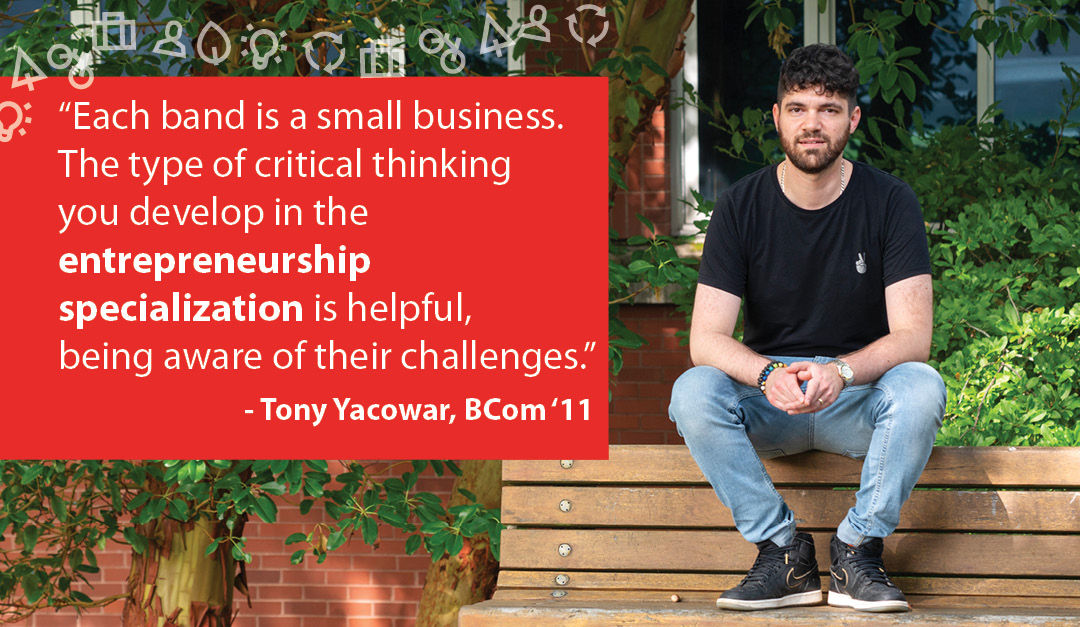By Aaren Madden. Originally published in the fall/winter 2020 issue of Business Class magazine. Photo: UVic Photo Services.
What Tony Yacowar, BCom’11, remembers most about the entrepreneurship specialization at Gustavson is how deeply satisfying it was when all the numbers landed right where they were supposed to.
“Student teams work on a bunch of projects in different classes that feed into one big, final project in fourth year,” he explains; his team created a film production company. “I was responsible for the finance part. It’s a good feeling when you have a giant Excel workbook where everything is connected and everything pulls through to the summary pages and balances nicely,” he says.
While any accountant can appreciate such numerical gratification, Yacowar is among a small stable of specialists—four in Victoria, six in Vancouver—in his current job at DMCL Chartered Professional Accountants’ Entertainment Group. Yacowar is a CPA who describes himself as a business manager, or CFO, for music artists and record labels. “It’s really hard for us to hire people because usually, somebody who’s a natural accountant won’t have the interest or patience to work with creative types, and somebody who wants to work in the music industry, they usually don’t have the patience for the spreadsheet,” explains Yacowar.
How did he find this niche? By applying his knack for numbers, creative intuition and genuine passion for music, the niche found him. Perhaps due to the ubiquity in his house growing up—his mother played piano and his father played guitar—Yacowar always loved music and sought to build a career around it. While in school, he played in a band. “It wasn’t very good, so it needed to end,” he insists, “but I was still passionate about the music industry.” After graduation, Yacowar gathered that passion around Public Records, a non-profit he founded with a former bandmate to help raise the profiles of emerging artists. For a time, they partnered with TELUS to create music video production grants for musicians from BC and AB.
As with his student projects, he was the one who ended up handling the accounting and finance at Public Records and, starting in 2013, he worked as a controller for a group of boutique record labels and musicians he met through his non-profit. It occurred to Yacowar that becoming a CPA was the next step. “It seemed like that was the value that I naturally brought to the team, so I thought I would make it official,” he says. In 2016, he made the Common Final Examination honour roll. Yacowar has been at DMCL for nearly four years now, and his unique blend of interest and aptitude serves him well. His ENT training helps him relate to his clients. “Each band is a small business,” he says.
“The type of critical thinking you develop in the entrepreneurship specialization is helpful, being aware of their challenges.” By day, he is at a computer performing various tasks on behalf of his clients—paying bills, tour reconciliation and sundry others—but he also receives frequent late-night texts. “Things need to be paid in the evening; [artists] need to know their GST number when they are settling a show at one in the morning and they don’t have it written down,” Yacowar says.
Being one himself, he understands creative types. In fact, some of those nights, between clients’ texts, he plays guitar and composes songs. (“Nothing ready for public consumption,” he jokes.) Other nights, he and his co-workers often support their clients at live shows. Unlike most accountants, who are slammed during April’s tax season, Yacowar gets another stretch of intensity during the summer touring months.
Except this year. “A lot of artists had their 2020 tours all planned out, then everything came crashing down,” he says, after the COVID-19 pandemic brought live events to an abrupt halt. “A lot of people are very worried; it’s been tough.” For musicians who tour as their livelihood, there is often no contingency, no backup plan. Government assistance has been essential. However, musicians, being innately creative, are finding workarounds. “I have one client who did a drive-in show, where everyone was sitting in their cars,” Yacowar mentions. Another BC artist has found a big way to support his fellow artists. Dan Mangan’s Side Door project is a website originally created to connect musicians with folks interested in hosting house concerts. Since the pandemic, it has pivoted to help meet musicians’ financial needs by converting to online streaming shows. “The average payout for an artist doing a show through Side Door has been $1,500, which is awesome, because touring has completely dried up,” Yacowar says.
Eventually, touring will resume—the sooner the better, for Yacowar’s clients. Until then, he continues steady support for clients in this slow-motion time, through the extended tax season and beyond. Like the musical entrepreneurs he works with, Yacowar knows the unexpected is part of doing business, and he’ll continue to support his clients with all the business knowledge and accounting wizardry at his command.


